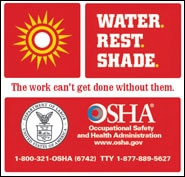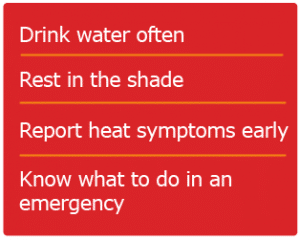
HEAT ILLNESS CAN BE DEADLY

In 2014 alone, 2,630 workers suffered from heat illness and 18 died from heat stroke and related causes on the job. Heat illnesses and deaths are preventable.
Employers must protect workers from excessive heat
Under OSHA law, employers are responsible for providing workplaces free of known safety hazards. This includes protecting workers from extreme heat. An employer with workers exposed to high temperatures should establish a complete heat illness prevention program.
- Provide workers with water, rest and shade.
- Allow new or returning workers to gradually increase workloads and take more frequent breaks as they acclimatize, or build a tolerance for working in the heat.
- Plan for emergencies and train workers on prevention.
- Monitor workers for signs of illness.
To prevent heat related illness and fatalities:
- Drink water every 15 minutes, even if you are not thirsty.
- Rest in the shade to cool down.
- Wear a hat and light-colored clothing.
- Learn the signs of heat illness and what to do in an emergency.
- Keep an eye on fellow workers.
- “Easy does it” on your first days of work in the heat. You need to get used to it.
Working in full sunlight can increase heat index values by 15 degrees Fahrenheit. Keep this in mind and plan additional precautions for working in these conditions.
Who is affected?
Any worker exposed to hot and humid conditions is at risk of heat illness, especially those doing heavy work tasks or using bulky protective clothing and equipment. Some workers might be at greater risk than others if they have not built up a tolerance to hot conditions,including new workers, temporary workers, or those returning to work after a week or more off. All workers are at risk during a heat wave.
Industries most affected by heat-related illness are: construction; trade, transportation and utilities; agriculture; building, grounds maintenance; landscaping services; and support activities for oil and gas operations.
What to do if a worker becomes ill?
- Call a supervisor for help. If a supervisor is not available, call 911.
- Have someone stay with the worker until help arrives.
Click here to listen to OSHA’s Heat Advisory Call.
Click here to download OSHA’s Heat Safety Tool Smartphone App.
Click here for more information from OSHA on heat safety.
OSHA is a Weather-Ready Nation Ambassador (WRN) committed to working with NOAA and other Ambassadors to strengthen national preparedness for and resilience against extreme weather.
How can OSHA help? Workers have a right to a safe workplace. If you think your job is unsafe or have questions, visit OSHA’s Worker’s Page or call 1-800-321-6742 (OSHA). It’s confidential. For other valuable worker protection information, such as Workers’ Rights, Employer Responsibilities, and other services OSHA offers, visit OSHA’s Workers’ page.
OSHA also provides help to employers. OSHA’s On-site Consultation Program offers free and confidential advice to small and medium-sized businesses in all states across the country, with priority given to high-hazard worksites. For more information or for additional compliance assistance contact OSHA at 1-800-321-6742 (OSHA).
Related News
- Operation Lifesaver campaigns to promote rail safety in 11 states
- New TD Crew Room Flyers Available
- Colorado bill criminalizing transit assault one step closer to becoming law
- Honoring the Legacy of Brother John A. Saunders
- Colorado Transit Worker Safety Bill (House Bill 25-1290)
- Kansas funds passenger rail expansion
- SMART’s General President Defends Our Brother
- Maryland Passes Monumental Transit Safety Bill
- Brother Wirth Crowned Champion in 168-Pound Masters Division Victory
- Chairman Pauli Announces Retirement, SMART-TD celebrates his career
